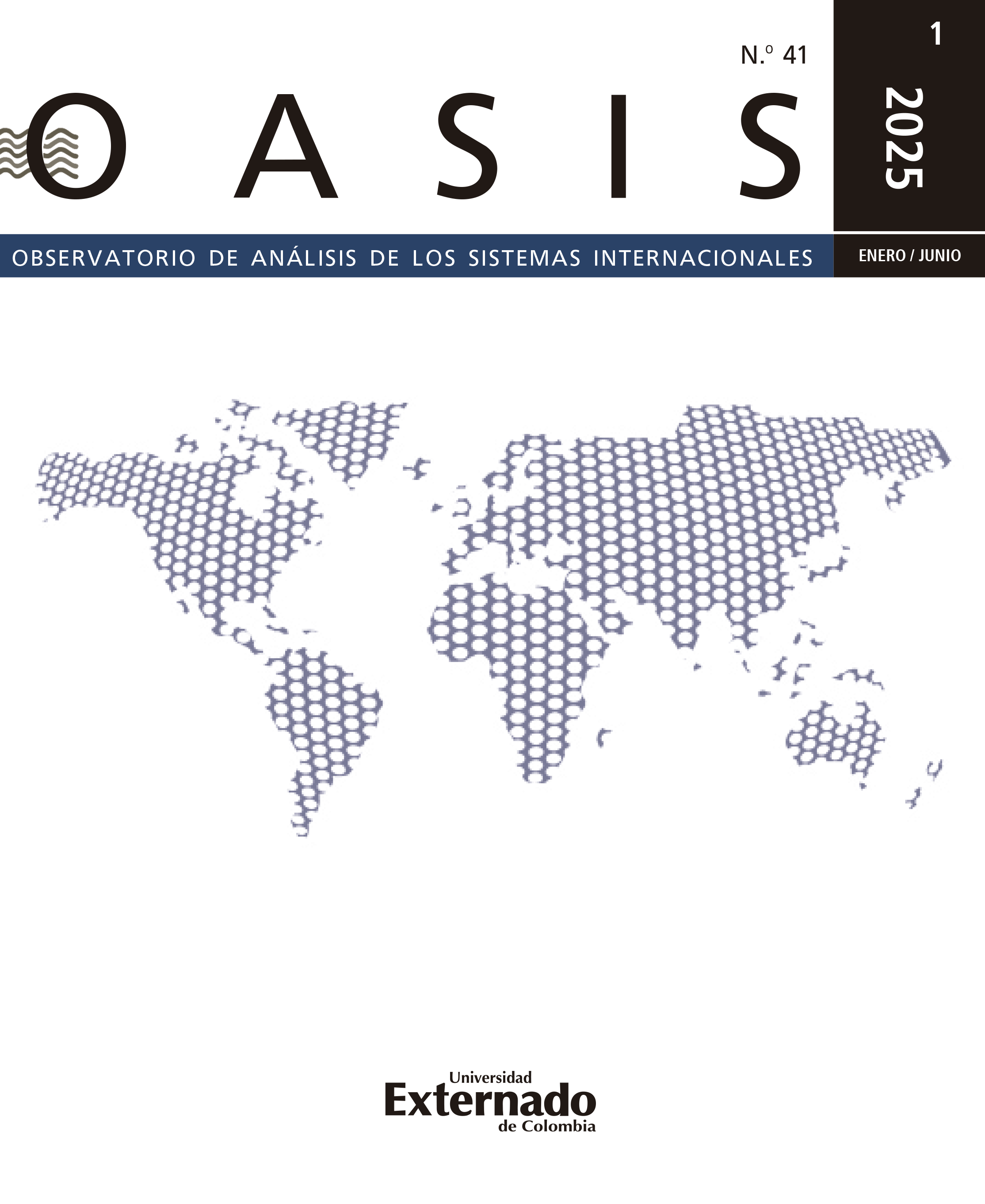Multipolarity, Alliances and Internal Balancing: Opportunities for Brazil
Multipolarity, Alliances and Internal Balancing: Opportunities for Brazil
Contenido principal del artículo
Resumen
El objetivo de este artículo es obtener una visión sobre el papel de Brasil en un escenario multipolar desequilibrado. Para lograr este objetivo, se presentan los principales conceptos y supuestos del neorrealismo y el neorrealismo ofensivo. Se argumenta que la estrategia óptima para Brasil en este momento es perseguir un balance interno para mejorar su posición de negociación entre las grandes potencias y competidores similares. En este sentido, el artículo es normativo, aunque sus recomendaciones se derivan de los imperativos del sistema, como las vulnerabilidades de las alianzas en un mundo multipolar. Estados Unidos está involucrado en áreas clave en Asia y Europa, lo que crea un margen de maniobrabilidad en América Latina, históricamente una zona de influencia para Estados Unidos. Además, Brasil debe fortalecer su poder material, ya que es un país de considerable riqueza y tamaño, y, por lo tanto, de interés para las grandes potencias. Para lograr una posición de negociación sólida, deben abordarse problemas estructurales como el gasto en defensa y la inversión. Concluimos que, independientemente de si Brasil “elige un lado” o mantiene una posición neutral, el balance interno es necesario para alcanzar sus objetivos.
Palabras clave
Descargas
Detalles del artículo
Referencias / Ver
Amorim Neto, O. (2011) De Dutra a Lula: a condução e os determinantes da política externa brasileira. Elsevier.
Ashford, E., Cooper, E. (2023, October 5). Yes, the world is multipolar: and that isn’t bad news for the United States. Foreign Policy. https://foreignpolicy.com/2023/10/05/usa-china-multipolar-bipolar-unipolar/.
Avila, R. (2014). Innovation and the warlike phenomenon. Austral: Brazilian Journal of Strategy & International Relations, 6(6).
Brasil (2020). Livro branco da defesa nacional 2020. https://www.gov.br/defesa/pt-br/assuntos/copy_of_estado-e-defesa/livro_branco_congresso_nacional.pdf
Brooks, S., and Wohlforth, W. (2008). World out of balance. Princeton University Press.
Campbell, P. (2019) Military Realism. University of Missouri Press.
Cepik, M., and Schneider, L. (2010) Kenneth Waltz. In M. Medeiros, M. Costa Lima, R. Villa, and R. Rocha Reis. (Eds.), Os Clássicos das Relações Internacionais (1st ed., Vol. 1, pp. 84- 109). Hucitec.
Christensen, T. J., and Snyder, J. (1990). Chain gangs and passed bucks: Predicting alliance patterns in multipolarity. International Organization, 44(2), 137-168.
Dawood, L. (2018). China’s military modernisation: international systemic change through internal balancing? Realism in Practice.
Diniz, E. P. L. (2017). Brazil’s nuclear submarine: A broader approach to the safeguards issue. Revista Brasileira de Política Internacional, 60(2).
Diniz, E. (2010). Defesa, orçamento e projeto de força: O Brasil em perspectiva comparada. In M. C. Cepik (Ed.),Segurança Internacional: práticas, tendências e conceitos. Hucitec, 2010.
Elias, N. (1993). O processo civilizador: Formação do estado e civilização. Zahar.
Elman, C. (1996). Horses for courses: Why not neorealist theories of foreign policy? Security Studies, 6(1), 7-53.
Elman, C. (1999). The logic of emulation: the diffusion of military practices in the international system. Columbia University.
International Institute for Strategic Studies (IISS). (2024). Military Balance 2024. https://www. iiss.org/publications/the-military-balance/
Herz, J. H. (1950). Idealist internationalism and the security dilemma. World Politics, 2(2), 157-180.
Herz, M., Dawood L., and Lage, V.C. (2017). A nuclear submarine in the South Atlantic: The framing of threats and deterrence. Contexto Internacional, 39(2), 329-350.
Herz, M. A. (2022). Conservative foreign policy for Brazil. Latin American Policy, 13(2), 376-388.
Legro, J. W., and Moravcsik, A. (1999). Is anybody still a realist? International Security, 24(2), 5-55.
Lieber, K. (2000). Grasping the technological peace: The offense-defense balance and international security. International Security, 25(1).
Malamud, A. (2011). A leader without followers? The growing divergence between the regional and global performance of Brazilian foreign policy. Latin American Politics and Society, 53(3),1-24.
Malinski, T. (2008). O Brasil e a ordem mundial multipolar. Revista da Escola Superior de Guerra, 24(49).
Mearsheimer, J. J. (2018). The great delusion: Liberal dreams and international realities. Yale University Press.
Mearsheimer, J. J. (2014). The tragedy of great power politics. W.W Norton & Company.
Pádua, L. (n.d.). Para Celso Amorim, o Brasil deve buscar mundo multipolar e não se alinhar a potências. Exame. https://exame.com/ para-celso-amorim-o-brasil-deve-buscar-mundo-multipolar-e-nao-se-alinhar-a-potencias/
Parent, J., and Rosato, S. (2015). Balancing in neorealism. International Security, 40(2).
Raska, M. (2015). Military innovation in small states: Creating a reverse asymmetry. Routledge.
Resende-Santos, A. (2008). Neorealism, states, and modern mass army. Cambridge University Press.
Rodriguez. J. C. C. (2012). Chacal ou cordeiro? O Brasil frente aos desafios e oportunidades do sistema internacional. Revista Brasileira de Política Internacional, 55(2), 70-89.
Schweller, R., and Pu, X. (2011). After unipolarity: China’s visions of international order in an era of U.S. Decline. International Security, 36(1), 41-72.
Soares De Lima, M. R., and Hirst, M. (2006). Brazil as an intermediate state and regional power: Action, choice and responsibilities. International Affairs, 82(1), 21-40.
Stockholm International Peace Research Institute (SIPRI). (2022). SIPRI yearbook 2022. Blackwell.
Valeriano, B. (2009). The tragedy of offensive realism: Testing aggressive power politics models. International Interactions, 35(2),179- 206.
Vasquez, J. A. (2007). The realist paradigm and degenerative versus progressive research programs: An appraisal of neotraditional research on Waltz’s balancing proposition. American Political Science Review, 91(4), 899-912.
Villa, R. A. D., and Viana, M. T. (2010). Security issues during Lula’s administration: From the reactive to the assertive approach. Revista Brasileira de Política Internacional, 53, 91– 114.
Visentini, P. G. F., and Silva, A. L. R. da. (2010). Brazil and the economic, political, and environmental multilateralism: The Lula years (2003-2010). Revista Brasileira de Política Internacional, 5, 54-72.
Waltz, K. (1979). Theory of international politics. Addison-Wesley Publishing Company.
Waltz, K. (1996). International politics is not foreign policy. Security Studies, 6(1).
Wohlforth, W. C. (1999). The stability of a unipolar world. International Security, 24(1), 5-41.










